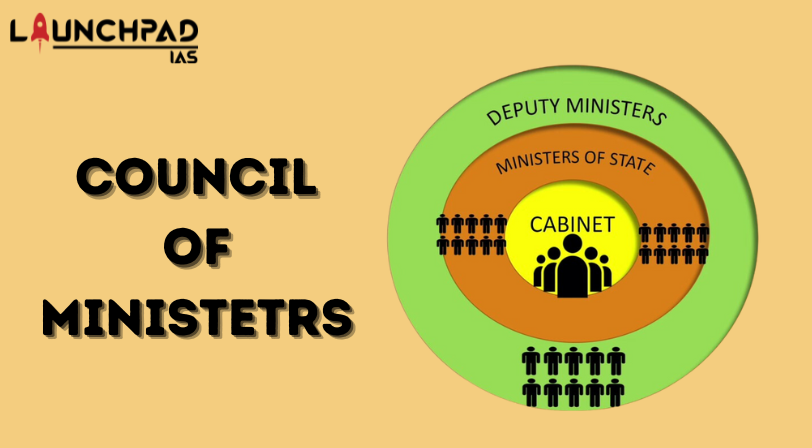About
- Article 74 of the Constitution deals with the status of the Council of Ministers while Article 75 deals with the appointment, tenure, responsibility, qualification, oath, and salaries and allowances of the ministers.
- The COM consists of three categories of ministers, namely, cabinet ministers, ministers of state, and deputy ministers. At the top of all these ministers stands the Prime Minister.
- Cabinet Ministers: These head the important ministries of the Central government like home, defence, finance, external affairs, and so forth.
The cabinet is the chief policy-formulating body of the Central government. - Ministers of State: These can either be given independent charge of ministries/ departments or can be attached to cabinet ministers.
- Deputy Ministers: They are attached to the cabinet ministers or ministers of state and assist them in their administrative, political, and parliamentary duties.
- Cabinet Ministers: These head the important ministries of the Central government like home, defence, finance, external affairs, and so forth.
- At times, the COM may also include a deputy prime minister. The deputy prime ministers are appointed mostly for political reasons.
Constitutional Provisions
- Article 74 (COM to aid and advise President): The advice tendered by Ministers to the President shall not be inquired into in any court.
The President may require the COM to reconsider such advice and the President shall act in accordance with the advice tendered after such reconsideration. - Article 75 (Other Provisions as to Ministers): The PM shall be appointed by the President and the other Ministers shall be appointed by the President on the advice of the PM.
- The total number of ministers, including the Prime Minister, in the COM shall not exceed 15% of the total strength of the Lok Sabha.
- This provision was added by the 91st Amendment Act of 2003.
- A minister who is not a member of the Parliament (either house) for any period of six consecutive months shall cease to be a minister.
- Article 77 (Conduct of Business of the Government of India): The President shall make rules for the more convenient transaction of the business of the Government of India, and for the allocation among Ministers of the said business.
- Article 78 (Duties of Prime Minister): To communicate to the President all decisions of the COM relating to the administration of the affairs of the Union and proposals for legislation.
- Article 88 (Rights of Ministers as Respects the Houses): Every minister shall have the right to speak and take part in the proceedings of either House, any joint sitting of the Houses and any Committee of Parliament of which he may be named a member. But he shall not be entitled to vote.
Responsibility of Ministers
- Collective Responsibility:
Article 75 clearly states that the COM is collectively responsible to the Lok Sabha. This means that all the ministers own joint responsibility to the Lok Sabha for all their acts of omission and commission. - Individual Responsibility:
- Article 75 also contains the principle of individual responsibility. It states that the ministers hold office at the pleasure of the President, which means that the President can remove a minister even at a time when the COM enjoys the confidence of the Lok Sabha.
- However, the President removes a minister only on the advice of the Prime Minister.
Council of Ministers in States
The Council of Ministers in the states is constituted and functions in the same way as the Council of Ministers at the Centre (Article 163: COM to aid and advise Governor) and Article 164: Other Provisions as to Ministers).


